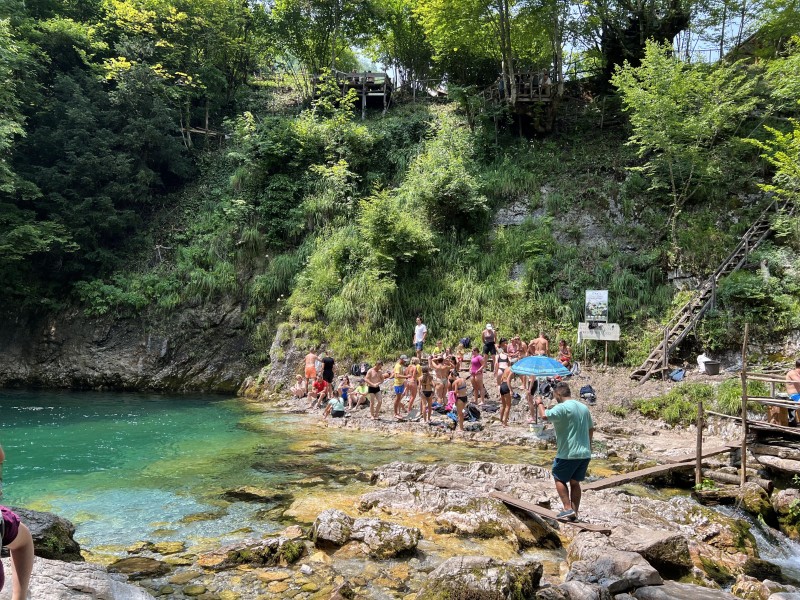Alnderim Çelohoxhaj
After an exceptionally successful tourism season, the data indicates that all stakeholders benefited from the increased number of tourists. From government institutions to tour operators, hotels, restaurants, and rental car companies, everyone played a significant role in achieving this success. Throughout the season, each party worked hard to adapt and provide their services and benefit from it. Now, it’s essential to shift our focus to understanding the impact of it.
Often referred to as “over-tourism,” it can have several negative impacts on both the environment and local communities in Albania. While tourism can bring economic benefits to an area, when it becomes excessive, it can lead to a variety of problems:
Loss of Authenticity: Overcrowded tourist destinations can lose their unique character and cultural authenticity. Local businesses may cater exclusively to tourists, leading to the loss of traditional customs and values. Many things have changed since tourism started in Albania. I understand that modernization can’t be avoided but it should impact only certain areas.
Seasonal Employment: Tourism jobs often tend to be seasonal and low-paying, providing limited economic stability for residents. This can create income inequality within communities. In this area, life was always connected to agriculture, and offering young people jobs only in hotels and restaurants will definitely stop them from working and living in villages. Focusing only on tourism will expose Albania to high risk, like Covid-19 when all the countries that were depending on tourism almost went bankrupt.
Increased Cost of Living: As tourist demand rises, so do prices for goods and services. This can lead to a higher cost of living for residents, making it difficult for them to afford to live in their communities. We already see the prices in the Capital when everything is getting expensive and often the residents can’t afford to have certain services. Holidays for the months of July and August when most of the companies and state administrate have their holidays prices went so high and many families switched from a week at the beach now is often only long weekends.
Displacement of Local Residents: In some cases, communities may be displaced as a result of tourism development. Land and housing prices may rise to the point where residents are forced to move elsewhere. Many cities like Tirana, Durres, Vlore, and Saranda have faced Airbnb houses have increased their rents and they will soon move out of the tourist area and go the areas that often are away from main public services, etc. Those who own apartment will have to share the building every day with other people and this change the community lifestyle
Strain on Natural Resources: Mass tourism can lead to the overuse and depletion of natural resources, such as water, energy, and food, which can affect the availability and quality of these resources for both tourists and locals.
Negative Impact on Wildlife: Wildlife can suffer from the disruption and habitat destruction caused by tourism. For example, sensitive ecosystems may be damaged, and wildlife may be disturbed, leading to negative consequences for biodiversity. The need for new buildings, airports, and roads has hurt wildlife. Limiting the number of tourists will definitely need fewer buildings. So far in Albania this is not yet a huge issue but soon it will if not controlled.
Albanian government should be concerned about the future and come up with a proper plan in which direction are we going, I would recommend that we all work hard on increasing the quality of service and providing clean and well-structured tourism infrastructure that will bring more benefits in the long term. Higher quality- higher prices- less impact on nature.
There is a better way for Albania to benefit from its nature, which we often say is blessed by GOD.
*****GREEN TOURISM*****
Sustainable or eco-tourism is a type of tourism that focuses on minimizing the negative impacts of tourism on the environment, culture, and communities while maximizing the benefits.
Environmental Conservation: Green tourism prioritizes the protection of natural environments, such as forests, wildlife, oceans, and ecosystems. It seeks to minimize pollution, habitat disruption, and resource consumption.
Cultural Respect: It promotes respect for local cultures and traditions. Travelers are encouraged to engage with local communities, learn about their customs, and contribute to their economic well-being through responsible spending. Albania is a very small country but it is very rich when it comes to history and cultural heritage.
Sustainable Practices: Green tourism businesses, such as hotels and tour operators, implement sustainable practices like reducing energy and water consumption, waste reduction, and sustainable sourcing of products.
Responsible Travel Behavior: Travelers are encouraged to minimize their environmental footprint by, for example, using public transportation, conserving resources, and practicing Leave No Trace principles.
Biodiversity Conservation: Many green tourism initiatives support the conservation of biodiversity, including endangered species and their habitats.
Education and Awareness: Green tourism emphasizes educating both tourists and industry professionals about environmental and cultural issues. This helps raise awareness and promote responsible behavior.
By adopting these principles, green tourism aims to provide tourists with unique and enriching experiences while preserving the natural and cultural heritage of the destinations they visit. It also contributes to the long-term sustainability of the tourism industry and the well-being of local communities.
You can follow Alnderim on LinkedIn: I am concerned about the increased number of tourists in Albania.
.
.
.
https://albaniamyway.com/tour/around-albania-culture-tour-8-days-7nights/
https://albaniamyway.com/tour/grand-tour-of-albania-10-days-9-nights/#itinerary
https://albaniamyway.com/tour/grand-tour-of-western-balkan-13-days-12-nights/#itinerary

